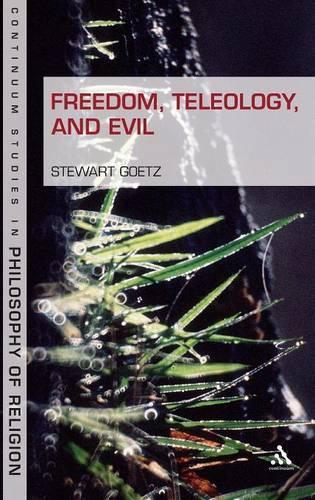
Freedom, Teleology, and Evil
(Hardback)
Available Formats
Publishing Details
Freedom, Teleology, and Evil
By (Author) Professor Stewart Goetz
Bloomsbury Publishing PLC
Continuum International Publishing Group Ltd.
21st November 2008
United Kingdom
Classifications
Tertiary Education
Non Fiction
210
Physical Properties
Hardback
218
Width 156mm, Height 234mm
Description
In Freedom, Teleology, and Evil Stewart Goetzdefends the existence of libertarian freedom of the will.He argues that choices are essentially uncaused events with teleological explanations in the form of reasons or purposes.Because choices are uncaused events with teleological explanations, whenever agents choose they are free to choose otherwise.Given this freedom to choose otherwise, agents are morally responsible for how they choose.Thus,Goetz advocates and defends the principle of alternative possibilities which states that agents are morally responsible for a choice only if they are free to choose otherwise.Finally, given that agents have libertarian freedom, Goetz contends that this freedom is integral to the construction of a theodicy which explains why God allows evil.
Reviews
'Goetz's book Freedom, Teleology, and Evil is highly original and, indeed, unique in that it is a systematic defense of a non-causal approach to agency, including free will and moral responsibility. The critical arguments are probing, and Goetz's positive suggestions are provocative and important. I highly recommend this book.' - John Martin Fischer, Professor of Philosophy, University of California, Riverside
'Goetz's remarkable book Freedom, Teleology, and Evil fills a much-needed gap in the contemporary discussion of the metaphysics of human freedom. For many years, philosophers have noted the existence of logical space for a thoroughly noncausal libertarian theory, but generally dismissed the idea as unworthy of serious or sustained discussion. Such disdain will be hard to defend in the wake of Goetz's careful and detailed defense of one version of this view. His position is presented with great clarity and precision, and difficulties alleged to bedevil the theory are met head-on. The extension of the view into theological issues in the final chapter is also much to be applauded. Many libertarians (including this one) may still have reservations regarding the noncausal approach even after reading this impressive book, but few will (or at least should) still doubt that it is an option worthy of libertarians' most serious consideration.' -Thomas Flint, Professor of Philosophy, University of Notre Dame
'In Freedom, Teleology, and Evil, Stewart Goetz skillfully develops a highly significant position on free will and moral responsibility. His central claim is that free choices are uncaused, but at the same time explained teleologically by purposes or reasons. Goetz argues that this view is attractive and important for two central reasons: it accommodates the intuitions that count against the compatibility of free will and determinism, and it provides an answer to the main challenge to libertarian accounts of free will: that because actions are undetermined, whether they occur is a matter of luck, and the agent is therefore not responsible for them. This book will be valuable to anyone interested in the problem of free will, and especially to those attracted to exploring new possibilities for libertarian views of agency.'- Derk Pereboom, Professor of Philosophy, Cornell University
"This book provides not only a sustained presentation of one non-causal libertarian view, but also a detailed engagement with objections to it, and an excellent introduction to a substantial body of the current literature on the topic of free will. It makes a significant contribution to that literature and would make an excellent text for a graduate seminar." -- Notre Dame Philosophical Reviews
"Both familiarizes readers with currant philosophical debates and provides a defense of an original theory with which they can profitably engage ... a good choice for graduate seminars as well as scholars in the field." Journal of Religious Studies
"Stewart Goetz's Freedom, Teleology, and Evil is an impressive defense of a non-causal libertarian view of free will. Though not without its defenders, noncausal accounts have tended to receive not only considerably less attention than have event-causal or agent-causal views, but also less sympathy. Goetz's book is a formidable challenge to these tendencies and worthy of attention by all those interested in free will.At the heart of Goetz's view is that free choices are, first and foremost, explained teleologically in terms of reason, where reasons are purposes or goals.' And it is this same consideration which leads him to reject both event-causal and agent-causal accounts of libertarian freedom. Why think that considerations of teleological explanation lead one to libertarianism in general, as opposed to compatibilism, and to a noncausal libertarian view in particular The answers to these questions are at the heart of Goetz's book. Along the way he also addresses the nature of intentions, the continued debate about Frankfurt-cases and the principle of alternative possibilities, the problem of evil, primal sin, and more."European Journal of Philosophy of Religion (Kevin Timpe, St. Peter's College, University of Oxford)
Freedom, Teleology, and Evil is an important contribution to the free will debate, and provides a serious and insightful defence of the non-causalist position, showing that the view deserves significantly more attention than it receives. It also makes an impressive contribution to the dispute about alternative possibilities. -- Nadine Elzein, University of Southampton, UK * Mind *
Author Bio
Stewart Goetz is the Ross Frederick Wicks Distinguished Professor in Philosophy and Religion at Ursinus College, USA. His previous books include The Soul Hypothesis (co-edited with Mark Baker, 2011), A Brief History of the Soul (co-authored with Charles Taliaferro, 2011), The Purpose of Life: A Theistic Perspective (2012), The Routledge Companion to Theism (co-edited with Charles Taliaferro and Victoria Harrison, 2012), and A Philosophical Walking Tour with C. S. Lewis (2015). He is the Series Editor of Bloomsbury Studies in Philosophy and Religion.
